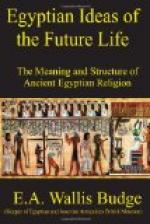CHAPTER II.
OSIRIS THE GOD OF THE RESURRECTION.
The Egyptians of every period in which they are known to us believed that Osiris was of divine origin, that he suffered death and mutilation at the hands of the powers of evil, that after a great struggle with these powers he rose again, that he became henceforth the king of the underworld and judge of the dead, and that because he had conquered death the righteous also might conquer death; and they raised Osiris to such an exalted position in heaven that he became the equal and, in certain cases, the superior of R[=a], the Sun-god, and ascribed to him the attributes which belong unto God. However far back we go, we find that these views about Osiris are assumed to be known to the reader of religious texts and accepted by him, and in the earliest funeral book the position of Osiris in respect of the other gods is identical with that which he is made to hold in the latest copies of the Book of the Dead. The first writers of the ancient hieroglyphic funeral texts and their later editors have assumed so completely that the history of Osiris was known unto all men, that none of them, as far as we know, thought it necessary to write down a connected narrative of the life and sufferings upon earth of this god, or if they did, it has not come down to us. Even in the Vth dynasty we find Osiris and the gods of his cycle, or company, occupying a peculiar and special place in the compositions written for the benefit of the dead, and the stone and other monuments which belong to still earlier periods mention ceremonies the performance of which assumed the substantial accuracy of the history of Osiris as made known to us by later writers. But we have a connected history of Osiris which, though not written in Egyptian, contains so much that is of Egyptian origin that we may be sure that its author drew his information from Egyptian




